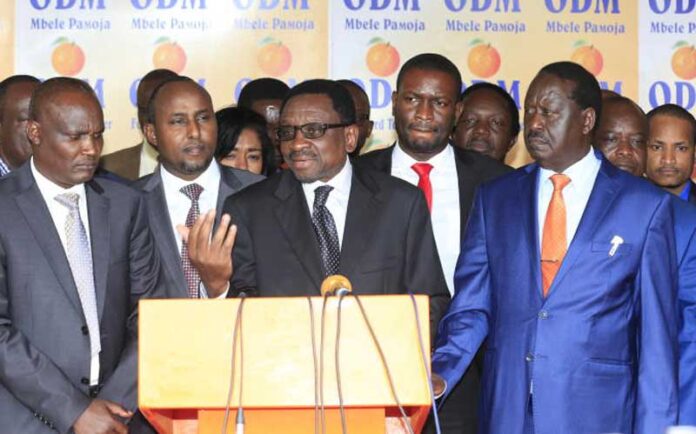By Violet Auma.
The recent court ruling declaring the Azimio coalition as the majority in Parliament has significantly reshaped Kenya’s political landscape, putting President William Ruto and his Kenya Kwanza administration in a precarious position.
This ruling has emboldened the opposition, with ODM leaders now demanding their rightful share of parliamentary leadership positions.
As Parliament resumes next week, ODM leaders have vowed to assert their influence, emphasizing that they will not be sidelined in the new parliamentary order.
Speaking at the Western Kenya ODM leaders’ regional meeting in Kakamega, the party leadership reaffirmed that ODM has no formal agreement with Ruto’s Kenya Kwanza under the broad-based government arrangement.
ODM Secretary-General Edwin Sifuna has been vocal about this, stating that ODM members must rally behind their leadership.
He reaffirmed that he speaks and acts on behalf of ODM, urging all members to respect and support the party’s official position.
During the Kakamega meeting, ODM leaders also criticized President Ruto’s recent directive to abolish vetting for identification card issuance in border counties.
Led by ODM leader Anyang’ Nyong’o, the leaders warned that this move could pose serious security risks to the country.
They announced plans to push for a motion in Parliament to revoke the directive.
Busia leaders echoed these concerns, arguing that lifting vetting requirements could compromise Kenya’s security and international relations.
Budalang’i MP Raphael Wanjala insisted that the vetting process must be reinstated to safeguard national interests.
Meanwhile, ODM is grappling with internal wrangles over the leadership of the Public Accounts Committee (PAC).
Sabaoti MP Caleb Amisi and Butere MP Tindi Mwale are both vying for the position. Mwale, who has been acting as PAC Chair for the past six months, argues that he deserves to be confirmed, while Amisi’s supporters insist he is the best candidate for the role.
The contest has divided ODM’s leadership, with some leaders from Kakamega County insisting that the position should be given to a representative from their region due to the high number of ODM-elected leaders.
The position fell vacant after former PAC Chair John Mbadi was nominated as Cabinet Secretary for Finance under the broad-based government arrangement.
Amidst the leadership wrangles, ODM’s top brass remains focused on strengthening the party at the grassroots level.
Acting ODM leader Gladys Wanga emphasized the need for unity and inclusivity, stating, “ODM is a democratic party, and no one will be dismissed for expressing their views.”
Leaders from Busia, Kakamega, Vihiga, and Trans Nzoia counties called for fair representation in party positions and government appointments.
Busia Governor Paul Otuoma urged the party to ensure Busia County is considered in key ODM nominations, arguing that the county has long been overlooked.
ODM Secretary of Political Affairs Rosa Buyu stressed that strengthening grassroots structures is essential for ODM to remain a formidable force ahead of the 2027 elections.
Navakholo MP Emanuel Wangwe and Nabii Nabwera called for ODM to clarify its stance on its relationship with the Kenya Kwanza government, urging the top leadership to provide a clear and united message.
In response to grassroots concerns, ODM announced plans to hold county-level meetings in Busia, Bungoma, and Trans Nzoia in the coming days to engage with local leaders and supporters.
These meetings aim to consolidate ODM’s support base and strategize for the upcoming political battles in Parliament.
As the political realignments continue, the coming weeks will be crucial in determining how ODM leverages its newfound parliamentary majority to influence national policies and governance.
The battle lines have been drawn, and all eyes are now on Parliament as the opposition seeks to assert its authority.



